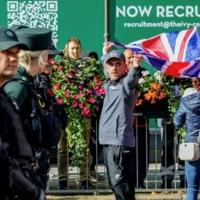A week of racism-fuelled disorder in Northern Ireland, sparked by disturbances in English towns and cities, is proving difficult to quell, with concerns that the region’s sectarian divisions are contributing to the violence.
“They burned down everything, there’s nothing left but ashes,” said Bashir, whose supermarket in Belfast was set ablaze during attacks on foreign-owned shops and businesses.
A mosque in a town near Belfast was also attacked on Friday night.
“We’re worried about what might happen next, there’s a lot of hostility towards the Muslim community,” said a 28-year-old man from Dubai, who preferred not to disclose his full name for safety reasons.
Northern Ireland has been experiencing nightly unrest, mainly in pro-UK loyalist areas, following an anti-immigration protest in Belfast on August 3.
The Police Service of Northern Ireland (PSNI) reported that 31 people have been arrested in connection with the disturbances.
“The attacks in Belfast share similarities with anti-immigration protests in white working class areas in England, the Republic of Ireland, and other parts of Europe,” explained Peter McLoughlin, a politics lecturer at Queens University Belfast.
“It’s driven by racism and fear of the other, but in Northern Ireland, it also intersects with sectarian political dynamics,” he added.
– ‘Under attack’ –
While the violent sectarian conflict known as the “Troubles” largely ended in 1998, tensions still exist between pro-UK Protestant loyalists and pro-Irish unity Catholic nationalists in Northern Ireland.
In the staunchly loyalist district of Sandy Row, where Bashir’s shop was located, symbols of allegiance to the UK are prevalent.
“Loyalists feel that their community and British identity are under threat,” McLoughlin elaborated. “They believe they must resist outsiders entering their areas, who are perceived as taking jobs and housing from Protestants and encroaching on their once-dominant community.”
Rioters targeted foreign-owned businesses in the aftermath of the anti-immigration protest, leaving a significant impact on the community.
“What happened last week was unbelievable,” shared Yilmaz Batu, a Turkish chef residing in Northern Ireland. “There was never any trouble before.”
The Northern Ireland Muslim Council attributed the violence to misinformation and disinformation on social media, creating false narratives about Muslims in the region.
– ‘Extremely shocking’ –
With low rates of immigration in Northern Ireland compared to the rest of the UK, the recent disorder has been particularly alarming for the community.
A solidarity rally organized by the United Against Racism group in Belfast aimed to denounce racism and fascism, drawing thousands of participants.
The rally countered an anti-immigration demonstration where protestors displayed British flags and anti-foreigner sentiments.
The unrest has led to uncertainty for affected businesses like Bashir’s supermarket, with the community’s support being crucial for their potential reopening.
pmu/jj/db





